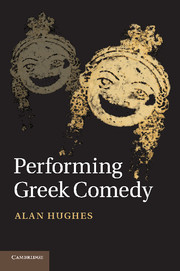Book contents
- Frontmatter
- Contents
- Illustrations
- Preface
- Chapter 1 Comedy in art, Athens and abroad
- Chapter 2 Poets of Old and Middle Comedy
- Chapter 3 Theatres
- Chapter 4 The comic chorus
- Chapter 5 Music in comedy
- Chapter 6 Acting, from lyric to dual consciousness
- Chapter 7 Technique and style of acting comedy
- Chapter 8 The masks of comedy
- Chapter 9 Costumes of Old and Middle Comedy
- Chapter 10 Comedy and women
- Chapter 11 New Comedy
- Catalogue of objects discussed
- Notes
- Glossary
- Bibliography
- Index
Chapter 1 - Comedy in art, Athens and abroad
Published online by Cambridge University Press: 05 February 2012
- Frontmatter
- Contents
- Illustrations
- Preface
- Chapter 1 Comedy in art, Athens and abroad
- Chapter 2 Poets of Old and Middle Comedy
- Chapter 3 Theatres
- Chapter 4 The comic chorus
- Chapter 5 Music in comedy
- Chapter 6 Acting, from lyric to dual consciousness
- Chapter 7 Technique and style of acting comedy
- Chapter 8 The masks of comedy
- Chapter 9 Costumes of Old and Middle Comedy
- Chapter 10 Comedy and women
- Chapter 11 New Comedy
- Catalogue of objects discussed
- Notes
- Glossary
- Bibliography
- Index
Summary
Theatre is a mimetic art, composite and ephemeral. Directed by an underlying aesthetic, conscious or intuitive, theatrical imitation may be culturally determined or intellectually constructed. Performers deliberately imitate the ‘other’, whether human or animal, divine or spirit, allegory or force of nature. This mimesis is a compound, a variable array of associated arts, which may include music, dance, song and speech, supported by oral or literary composition. And every performance occurs in a unique, irrecoverable moment of time. Greek theatre is no exception. Ancient performances cannot be revived, but we have learned a good deal about their form and circumstances.
This is a book about performance practice, the art of comic theatre in classical Greece. Historically, comedy has been examined less thoroughly than tragedy, in part perhaps because the extant texts are fewer and less representative, and documentary evidence comparatively scarce. While thirty-three extant tragedies are attributed to the three most celebrated poets, we have only eleven comedies by Aristophanes, and one by Menander, with some substantial fragments. The works of their rivals have disappeared. The extant tragedies represent continuous development during the greater part of the fifth century, while the comedies yield little more than snapshots of two widely separated eras.
- Type
- Chapter
- Information
- Performing Greek Comedy , pp. 1 - 16Publisher: Cambridge University PressPrint publication year: 2011



